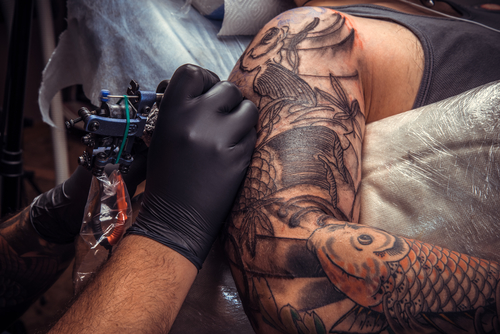 As of 2012, one in five adults in the United States have at least one tattoo. While some designs are simple, many are incredibly complex, original works of art. However, since tattoos are designed to be permanent, and often placed to be seen, the question arises – who owns the copyright to that artwork? And how can, and can’t, the owner display it?
As of 2012, one in five adults in the United States have at least one tattoo. While some designs are simple, many are incredibly complex, original works of art. However, since tattoos are designed to be permanent, and often placed to be seen, the question arises – who owns the copyright to that artwork? And how can, and can’t, the owner display it?
There are a few cases that have arisen in recent years that may shed some light on the rights of the tattoo artist and the right of the human owner of the tattoo. The issue recently gained notoriety because of the movie The Hangover: Part II. A character in the movie wakes up after a night of drinking with a replica of Mike Tyson’s iconic famous tattoo on his face. Tyson’s tattoo artist had registered the design with the United States Copyright Office and sued for copyright infringement. While the judge, in a hearing, seemed to clearly believe that tattoos could be copyrighted, the case settled out of court without a definitive judgement. Unfortunately, there are no cases to date that definitively answer the questions around copyright infringement and tattoos. With a new case filed by a tattoo artist in April 2018, concerning a tattoo he placed on WWE wrestler Randy Orton, which appeared in the WWE 2K16, 2K17 and 2K18 video games, it is important to determine what we do know about whether tattoos can be copyrighted, and who owns what rights with regard to their use and reproduction.
Rights of the Artist
According to 17 U.S.C. § 102, copyright protection exists “in original works of authorship fixed in any tangible medium of expression… from which they can be perceived, reproduced, or otherwise communicated.” Tattoos do seem to meet the perception and reproduction standard, as they can be seen on exposed skin and reproduced in photographs (and as digital representations in video games). Tattoos also meet the “fixed in any tangible medium of expression” standard. The question seems to be, for each particular tattoo, as to whether it is an “original work of authorship.”
The opinion of the Copyright Office seems to be that tattoos are indeed worthy of copyright protection – on April 19, 2011, the tattoo artist responsible for Mike Tyson’s tattoo received a registration for it as artwork on a 3D object. It is notable, however, that Tyson signed a release stating that “all artwork, sketches and drawings related to [his] tattoo and any photographs of [his] tattoo are property of Paradox-Studio of Dermagraphics” (the business name under which the tattoo artist worked)
However, not all tattoo artists currently have such releases on hand, or deal with clients famous enough to be concerned. Usually, there is an understanding, as discussed below, that the tattoo recipient has the right to live their life without concern about the tattoo being seen or used in a selfie. However, case law suggests that a line is crossed when a design is misappropriated. That said, if a tattoo artist wants to set clear limits on the commercial use of their artwork, having a release on hand might not be the worst idea.
Rights of the Subject
For the average Joe or Jane, the question of copyright ownership over their tattoo is likely a low priority. Whether getting a Mickey Mouse tattoo on your ankle infringes Disney® copyrights may be exciting dinner conversation, it probably will not end in a lawsuit. Additionally, it’s generally understood that those getting tattoos will be displaying them – on their person, in pictures, and on social media. Further, since such use is likely non-commercial, and probably is protected by fair use.
However, for celebrities, it should be part of the pre-application discussion. Commercial use regarding a celebrity which prominently displays a tattoo may run afoul of the artist’s copyright. It is still an unsettled question whether there is an implied right of reproduction that would allow for images to be taken of a celebrity that show the tattoo without consulting the tattoo artist for permission.
What to do about that Tattoo
Most of the tattoo cases to date share an important feature – the tattoo was used in a commercial work and was not displayed in its original state – e.g. it was not on the body of the celebrity who initially received it. In the case concerning the WWE video games, the tattoo was reproduced on a digital rendition of the wrestler in question. In The Hangover: Part II, the tattoo was depicted on an actor who was not Mike Tyson. However, many entities are not taking the chance that a future court may grant additional protection for different circumstances. For example, the NFL Players Association has asked all football players to get releases from tattoo artists before any future ink is applied.
Without a legal decision as a guide, it is not clear exactly where copyright protection may extend. However, there may be some steps that can be followed in order to avoid a costly judgement or settlement. First, the tattoo must be copyrightable subject matter. For example, a tattoo must be both original, and the tattoo artist must be the author. So, if the design is not new, or if the tattoo artist did not originate the design, then there may not be any infringement concerns. Second, the tattoo recipient can negotiate regarding who owns rights regarding the tattoo. If the tattoo artist agrees that the tattoo is a work-for-hire product, then there may not be an infringement issue. Additionally, the tattoo artist may agrees to license the tattoo design for reproduction. Third, at least some uses may fall under a fair use defense. But, for companies planning to create reproductions of a potentially copyrightable tattoo, it may be better to ask for permission than to hope for forgiveness.
Image Source: Deposit Photos.

![[IPWatchdog Logo]](https://ipwatchdog.com/wp-content/themes/IPWatchdog%20-%202023/assets/images/temp/logo-small@2x.png)

![[Advertisement]](https://ipwatchdog.com/wp-content/uploads/2024/04/UnitedLex-May-2-2024-sidebar-700x500-1.jpg)
![[Advertisement]](https://ipwatchdog.com/wp-content/uploads/2024/04/Patent-Litigation-Masters-2024-sidebar-700x500-1.jpg)

![[Advertisement]](https://ipwatchdog.com/wp-content/uploads/2021/12/WEBINAR-336-x-280-px.png)
![[Advertisement]](https://ipwatchdog.com/wp-content/uploads/2021/12/2021-Patent-Practice-on-Demand-recorded-Feb-2021-336-x-280.jpg)
![[Advertisement]](https://ipwatchdog.com/wp-content/uploads/2021/12/Ad-4-The-Invent-Patent-System™.png)






Join the Discussion
9 comments so far.
B
July 29, 2018 03:03 pm“Getting a tattoo says more about your decision making process than you might think.”
I got a tattoo when I lost my daughter. It’s a small bird on my right shoulder blade. It’s mostly out of sight and reminds me, but not too often. There was pain in the tattoo process, but I found it cathartic.
Benny, I’m not criticizing you, and I’m sure we can agree that there’s way too many bad tattoos running around on the streets. I’m just saying don’t read too much into everyone’s ink.
B
July 29, 2018 01:31 pm“Getting a tattoo says more about your decision making process than you might think.”
Really?
I got a tattoo when I lost my daughter. It’s a small bird. It’s on my right shoulder blade where I can’t see it except occasionally. It reminds me of what I’ve lost, but not too often.
There’s pain in the tattoo process, but at the same time it was cathartic.
I don’t know why everyone gets a tattoo. I’m not trying to criticize you, Benny. Honestly. I felt the same way in over 50 years of life about ink. There’s a lot of bad ink running the streets, but try not to read too much into what a tattoo says.
Anon
July 29, 2018 12:31 pmBenny,
As does your immediate negative reaction to the mere presence of a tattoo.
I will bet though that you do not even realize the hypocrisy of your post.
Benny
July 29, 2018 02:01 amAnon @ 1,
“I have pieces where the original idea was mine and where I worked closely with the artist to agree on colors, placement, style, and more”
If I walk into a law office and see my attorney sporting an ugly and flamboyant tattoo, it’s more than likely that I am taking my custom elsewhere. (The same holds for my insurance agent, bank manager, doctor and financial adviser). Getting a tattoo says more about your decision making process than you might think.
Anon
July 27, 2018 03:51 pmThanks fellow Anon – the reason why I asked was that the work for hire doctrine was the very first thing that I thought of in relation to the fact that the person obtaining the tattoo is expressly paying for that service. Naturally, the entirety of the “canvas” is that person’s skin, and “the collection” is solely controlled by the person paying for and obtaining the individual items.
All of which makes the topic very interesting.
Anon
July 27, 2018 09:28 amFellow Anon,
It appears the site i was using to look at 17 U.S.C. 101 left out a critical detail that it would have be agreed upon so my original post about a collective work was not correct.
B
July 27, 2018 08:44 amConsidering the placement of many tattoos, discovery can be intrusive if not highly interesting
Anon
July 27, 2018 07:26 amSister Anon,
Do you have authority for the proposition that intending a collection necessitates the work for hire status?
Anon
July 26, 2018 10:58 amInteresting article! I think another interesting question that arises out of this context is whether and how much of the person receiving the tattoo’s input does it take to cross the line into co-authorship. I have pieces where the original idea was mine and where I worked closely with the artist to agree on colors, placement, style, and more. Surely at some point I would become a coauthor.
Also, can an argument be made that so long as I have one other tattoo or intend to get another that the artist is contributing to a compilation or collective work such that the tattoo is always a work for hire?